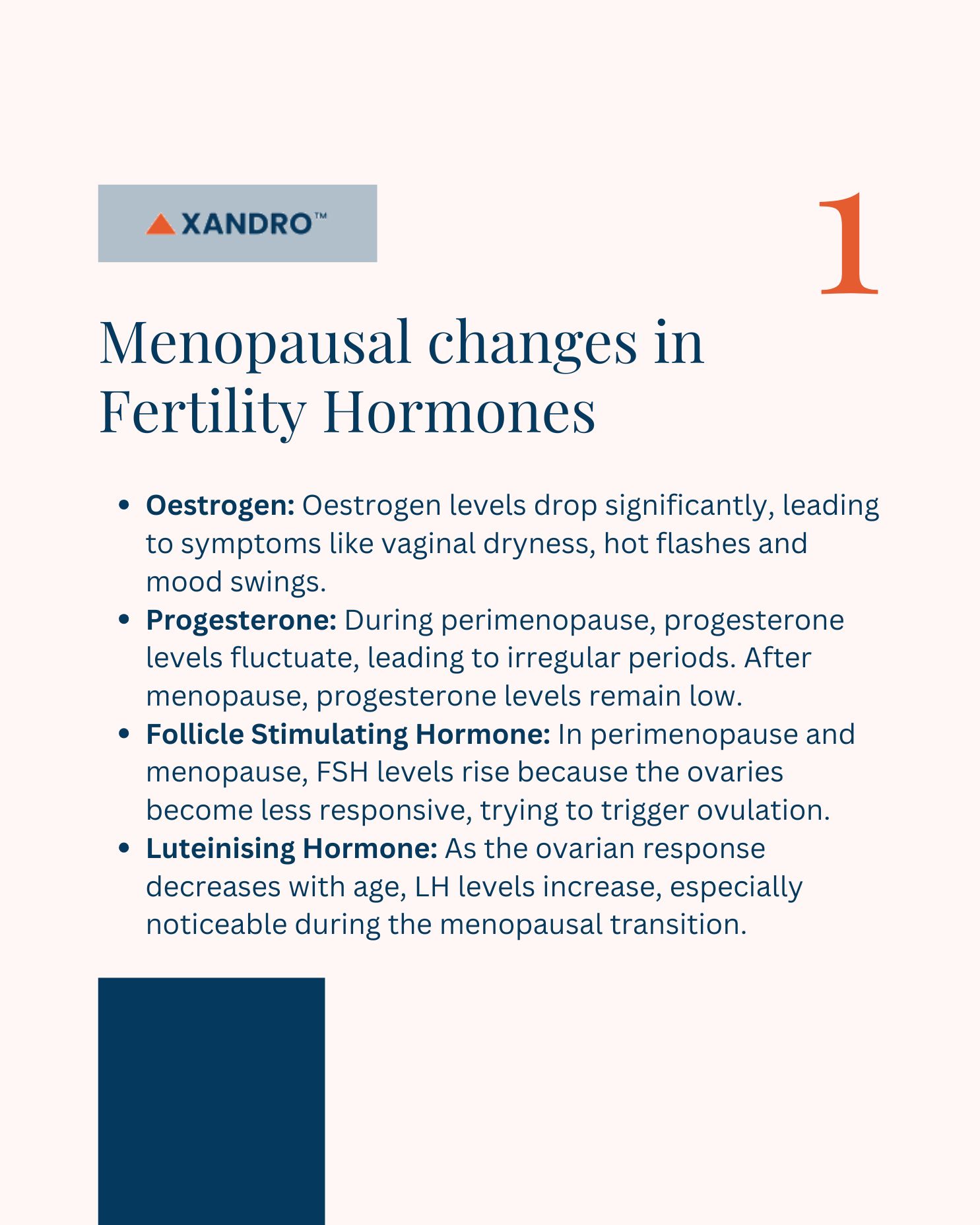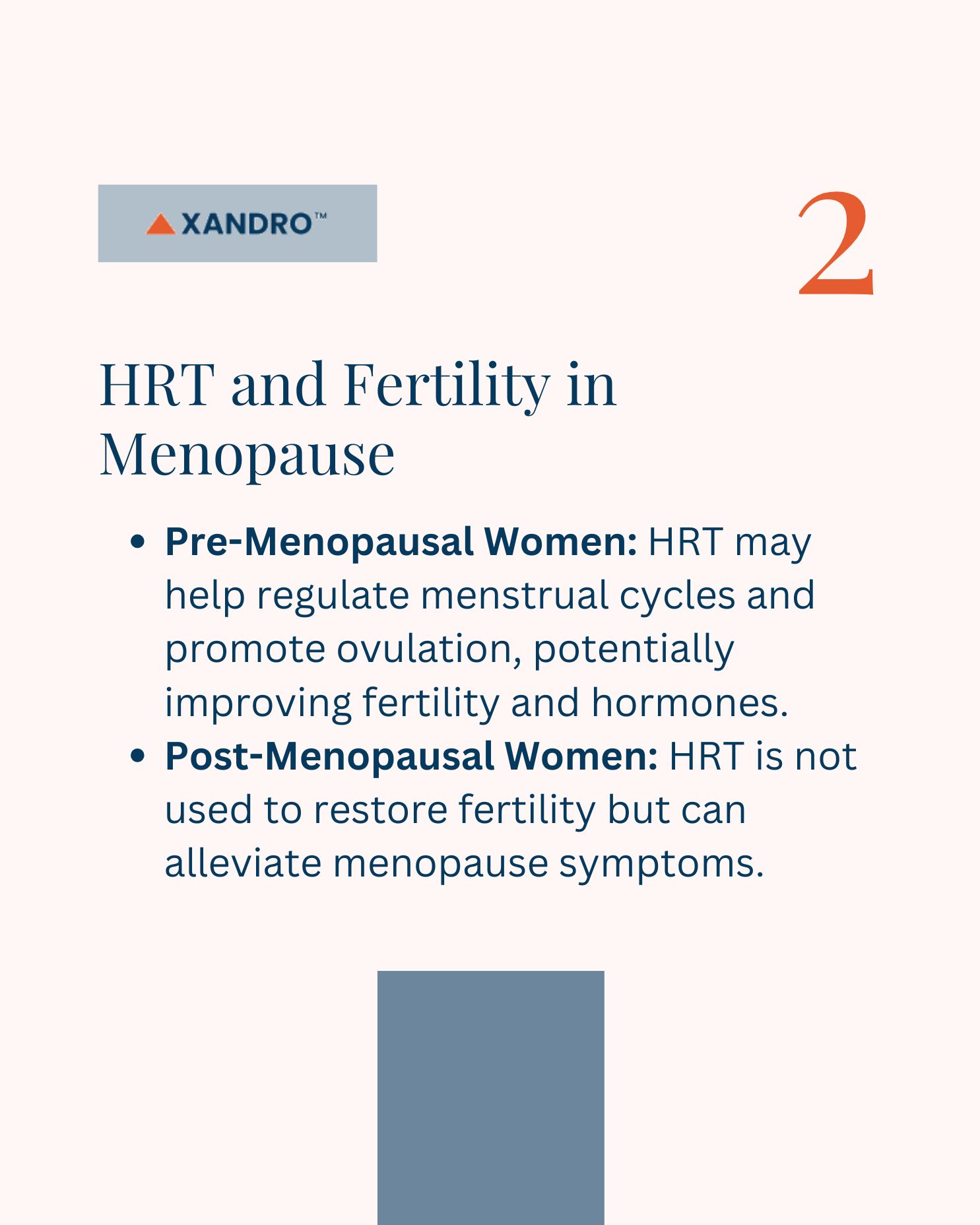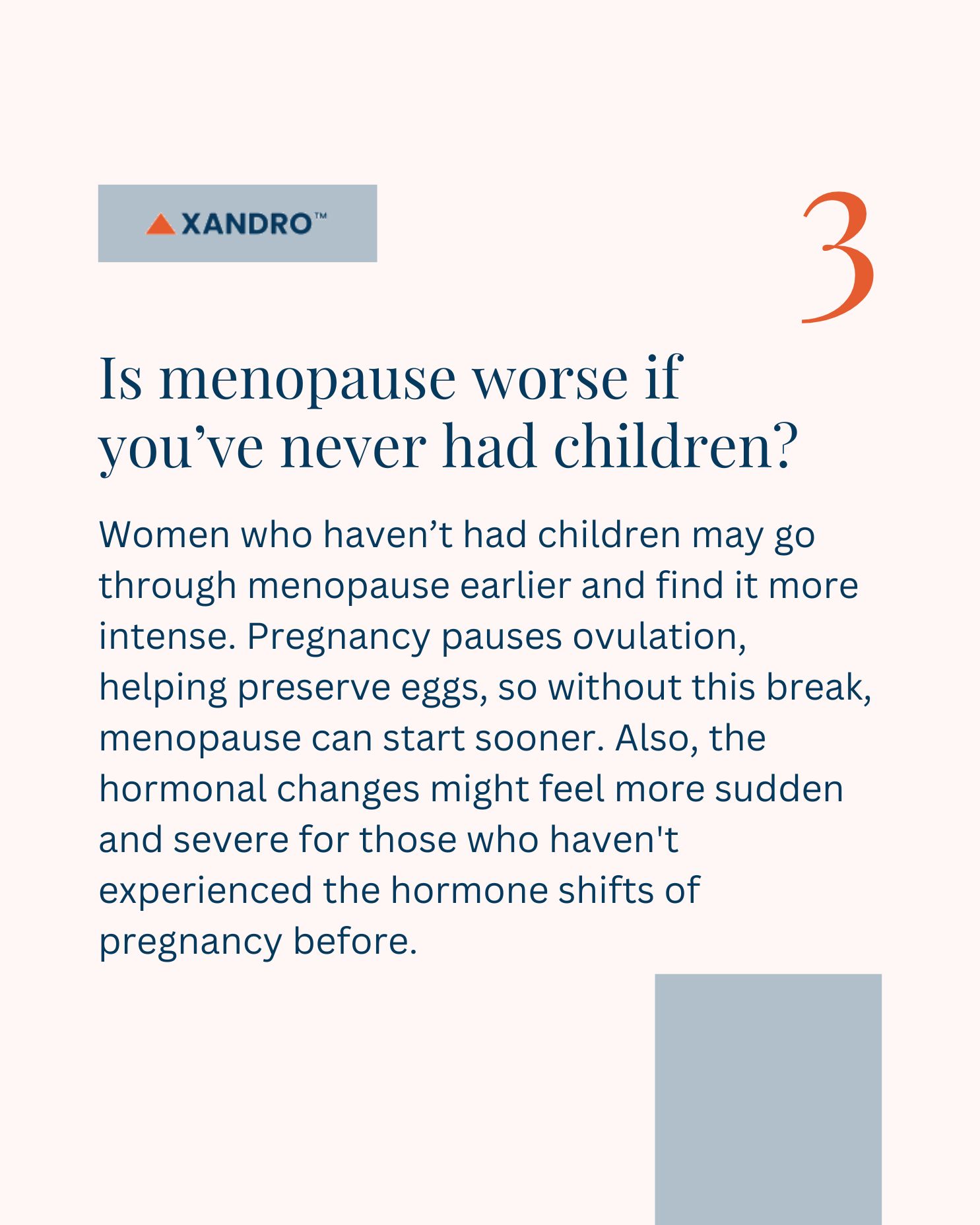Fertility & Menopause: Signs You Need Hormone Therapy
19th Nov 2024
Understanding Fertility and Hormone Therapy During Menopause
Menopause and fertility hormones; what exactly happens to a woman’s reproductive system during menopause?
Menopause is a natural process that happens when a woman’s ovaries stop releasing eggs and her body’s oestrogen and progesterone levels drop. As the number and quality of eggs in the ovaries decrease, fertility declines, but in some cases, it’s still possible to conceive.
Let’s go over some changes in your hormones once menopause hits. Jump there now:
Further Reading: What You Need to Know About Menopause
Menopause is the point when a woman has not had a menstrual period for 12 consecutive months, signalling the end of her reproductive years. Perimenopause is the transitional phase leading up to menopause, which usually begins in a woman’s 40s but can start earlier and lasts several years.
During perimenopause, hormone levels fluctuate as the ovaries gradually produce less estrogen and progesterone. This hormonal shift can lead to symptoms like hot flashes, irregular periods and mood swings. Even though fertility declines during this time, it’s still possible to get pregnant. In menopause, the ovaries stop releasing eggs entirely, and the levels oestrogen, progesterone, luteinising hormone and follicle-stimulating hormone reach a new balance.
Further Reading: All About Fertility Hormones
Postmenopause is the period after menopause when hormonal levels stabilise at lower levels and ovulation no longer occurs. At this stage, the chance of pregnancy is zero and birth control is no longer necessary.
Here’s how your fertility hormones change during menopause.
- Oestrogen: As women approach menopause, oestrogen levels drop significantly, leading to symptoms like vaginal dryness, hot flashes and mood swings.
- Progesterone: During perimenopause, progesterone levels fluctuate, leading to irregular periods. After menopause, progesterone levels remain low.
- Follicle Stimulating Hormone: In perimenopause and menopause, FSH levels rise because the ovaries become less responsive, trying to trigger ovulation.
- Luteinising Hormone: As the ovarian response decreases with age, LH levels increase, especially noticeable during the menopausal transition.
Further Reading: Foods to Avoid During Menopause

Fertility naturally declines as women age:
- In Your 30s: Fertility starts to decrease, particularly after the age of 35.
- In Your 40s: As women enter perimenopause, fertility drops significantly, however, it’s not zero and pregnancy is still possible, so birth control is recommended if pregnancy is not desired.
- In Your 50s: Menopause typically occurs between 45 and 55. If a woman has not had a period for 12 consecutive months and is not using hormonal contraception, she is considered to be in menopause and her fertility has effectively ended.
- Premature Menopause: Around 1 per cent of women experience menopause before the age of 40, known as premature ovarian insufficiency (POI). In some cases, natural conception is still possible, especially if no specific cause for early menopause is found.
Trying for a Baby During Perimenopause
Women in perimenopause who want to conceive may face challenges due to irregular ovulation but can still get pregnant. Fertility treatments or consultations with a specialist may be helpful and taking prenatal vitamins like folic acid is recommended. For those with POI who wish to have children, your doctor and fertility clinics can offer specific advice and support.
Further Reading: Incontinence During Menopause
Hormone Replacement Therapy (HRT) is a treatment used to reduce symptoms of menopause by supplementing the body with hormones like oestrogen and progesterone. It can help with hot flashes, night sweats, mood changes and vaginal dryness.
Types of HRT:
- Oestrogen Therapy: Helps alleviate symptoms by supplementing the declining estrogen levels in the body. It can be given as pills, patches, gels or creams.
- Combined Oestrogen and Progesterone Therapy: Used for women who still have their uterus, as taking estrogen alone may increase the risk of uterine cancer. Progesterone balances the effect by protecting the uterine lining.
Impact on Fertility:
- Pre-Menopausal Women: HRT may help regulate menstrual cycles and promote ovulation, potentially improving fertility and hormones.
- Post-Menopausal Women: HRT is not used to restore fertility but can alleviate menopause symptoms.

What are the signs that you need hormone replacement therapy?
HRT is typically considered for women experiencing severe menopausal symptoms, such as mood changes, sleep disturbances, bone loss, vaginal dryness, low energy, memory problems, hot flashes and early menopause. The timing of HRT also matters; starting it closer to the onset of menopause may provide the most benefit, while long-term use carries some risks.
Prolonged use of HRT can increase the risk of blood clots, breast cancer and cardiovascular issues, so it’s incredibly important for women to weigh the benefits and risks with their healthcare provider before starting HRT.
Further Reading: Menopause and Brain Fog
Is menopause worse if you’ve never had children?
Menopause can be more challenging for women who have never had children. Studies suggest that women without children might experience menopause earlier, particularly if they started menstruating at a younger age. This is because pregnancy can temporarily pause ovulation, conserving the ovarian reserve. Without this pause, women may reach menopause sooner. Also, the hormonal changes during menopause may feel more abrupt and intense for those who have never been through pregnancy, as their bodies haven't previously experienced a comparable hormonal shift.

Does menopause make you more fertile?
Menopause does not increase fertility, it actually does the opposite; it marks the end of a woman's reproductive years. During perimenopause (the transition phase leading up to menopause), irregular ovulation can still occur, which means pregnancy is possible but increasingly unlikely. Once a woman reaches menopause (defined as 12 consecutive months without a period), ovulation stops entirely, and she is no longer fertile.
Can you get pregnant after menopause with hormones?
It is possible to achieve pregnancy after menopause, but only through assisted reproductive technologies like in vitro fertilization ( IVF). In such cases, hormone replacement therapy (HRT) is used to prepare the uterus for embryo implantation, but the eggs must come from a donor because post-menopausal ovaries no longer produce viable eggs. This is a complex procedure and is typically recommended only in specific circumstances due to health risks associated with late pregnancies.
Can you get pregnant after menopause?
Naturally, it is not possible to get pregnant after menopause since the ovaries no longer release eggs. As mentioned, however, pregnancy can still occur with medical intervention like IVF using donor eggs. This is why birth control is recommended until menopause is confirmed (12 months without a period), as pregnancy remains possible during perimenopause, even with irregular cycles.
For more specific advice, we recommend that you speak to your doctor, especially if considering hormone treatments or reproductive options during or after menopause.
Further Reading: NMN and Menopausal Symptoms
If you’re struggling with menopause, you’re not alone. The changes in hormones that your body undergoes wreak havoc in many ways and symptoms can take a mental and physical toll.
Speak with your doctor to see if there are any ways to help ease your symptoms and ask if certain supplements, such as Xandro’s Menopause Bundle, might help you. With BCM® Turmeric Curcumin, Spermidine, Calcium AKG and Shoden® Ashwagandha, these supplements have been researched to mitigate symptoms of hot flashes, improve sleep quality and reduce stress and anxiety.
Don’t let unbalanced hormones reduce your quality of life. Through advice from your medical professional and biohacking, you can improve your hormones and start to feel better through this next phase of your life.
